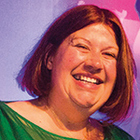
 Clare Crowther, head of nursery, Atelier Nursery Bath; winner, Nursery World's Nursery of the Year 2016
Clare Crowther, head of nursery, Atelier Nursery Bath; winner, Nursery World's Nursery of the Year 2016
‘2017 is without doubt going to bring significant changes both to the sector, as we see the 30 hours implemented and what funding supports this, and as a provider as we expand our services and open our second setting.
‘I hope for effective relationships with the local authorities I work alongside. With historical inconsistencies surrounding the administration of funded hours, I hope the new model agreement will enable providers to work transparently with their LAs and unnecessary barriers will be removed from the Local Code of Practice.
Register now to continue reading
Thank you for visiting Nursery World and making use of our archive of more than 35,000 expert features, subject guides, case studies and policy updates. Why not register today and enjoy the following great benefits:
What's included
-
Free access to 4 subscriber-only articles per month
-
Unlimited access to news and opinion
-
Email newsletter providing activity ideas, best practice and breaking news
Already have an account? Sign in here









